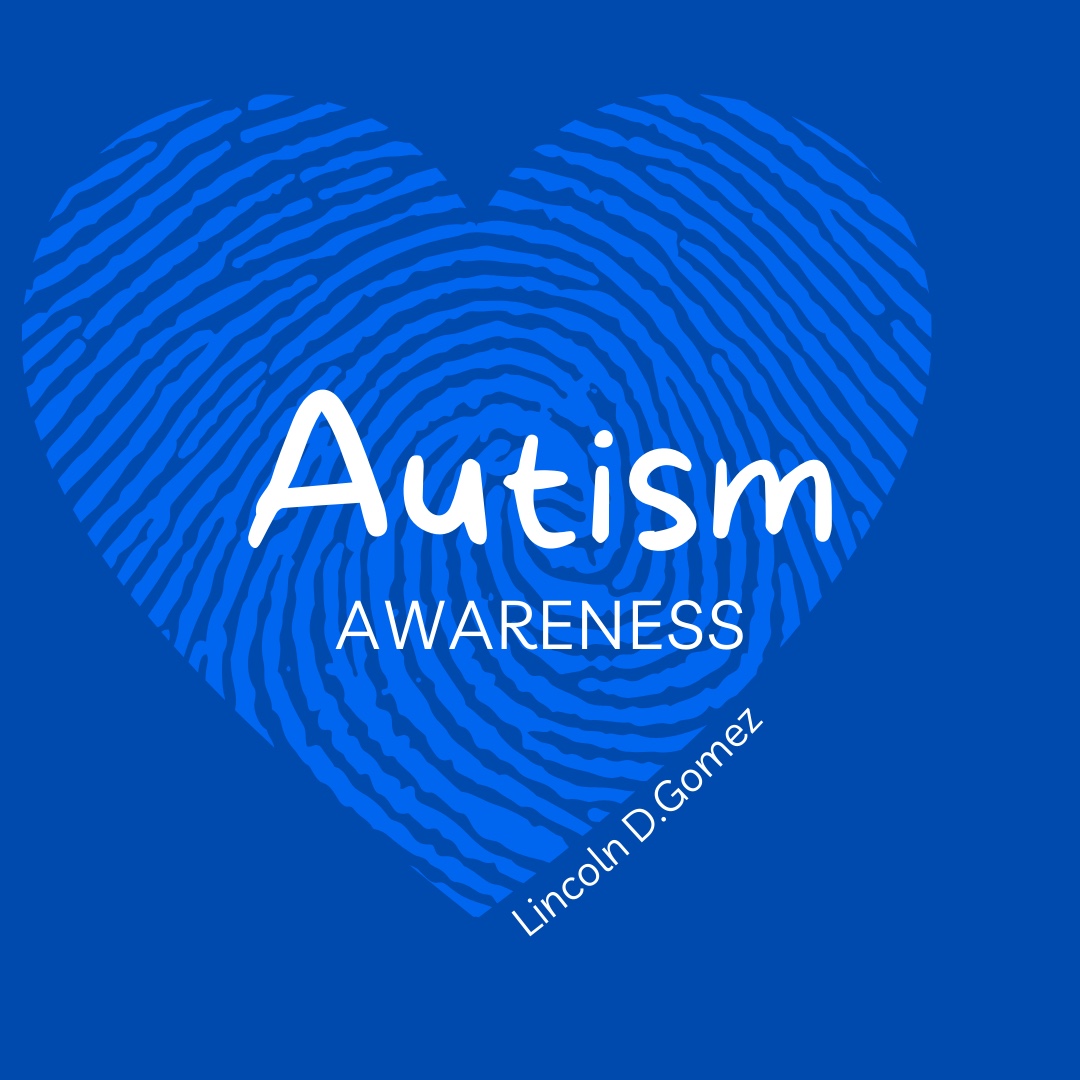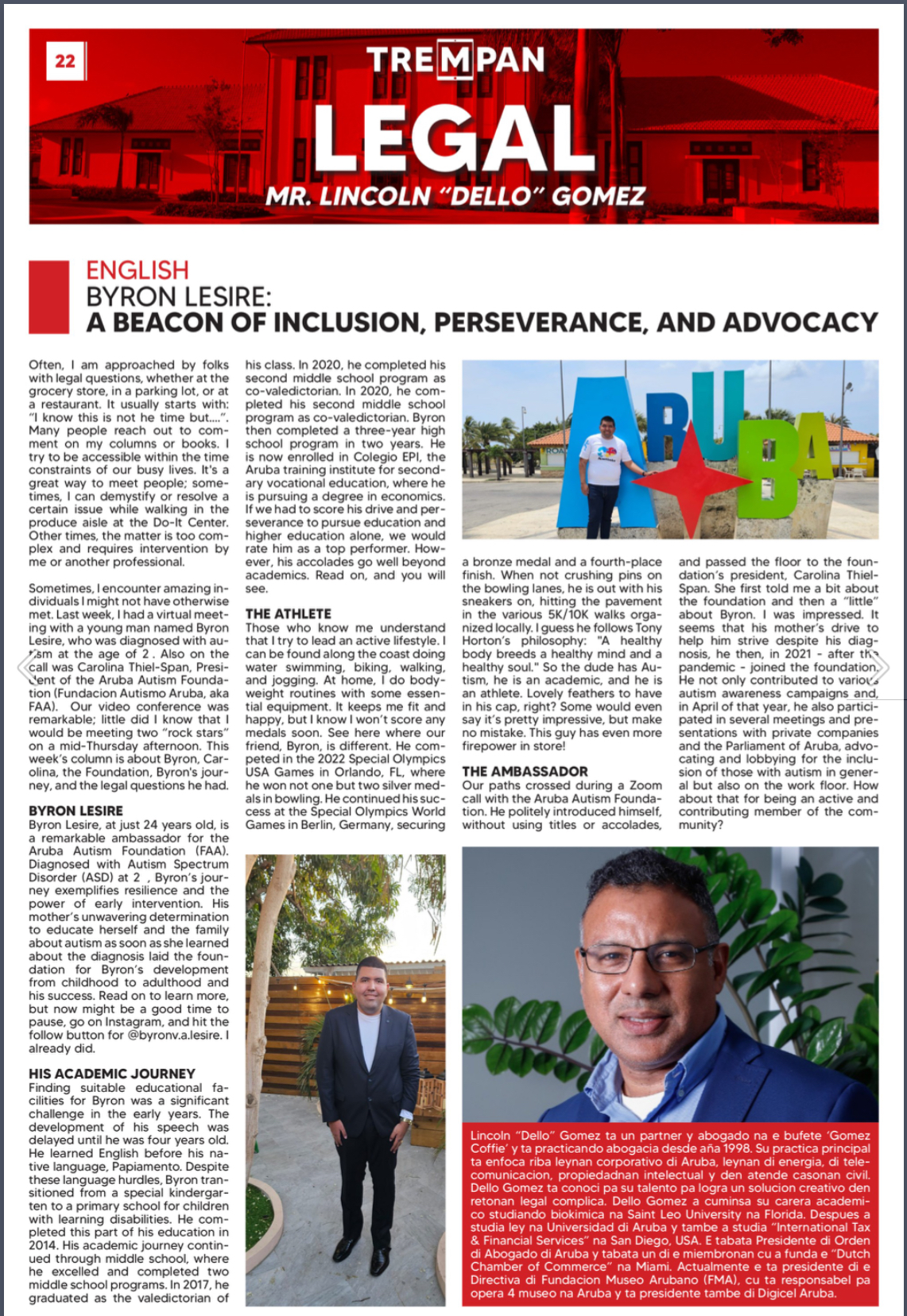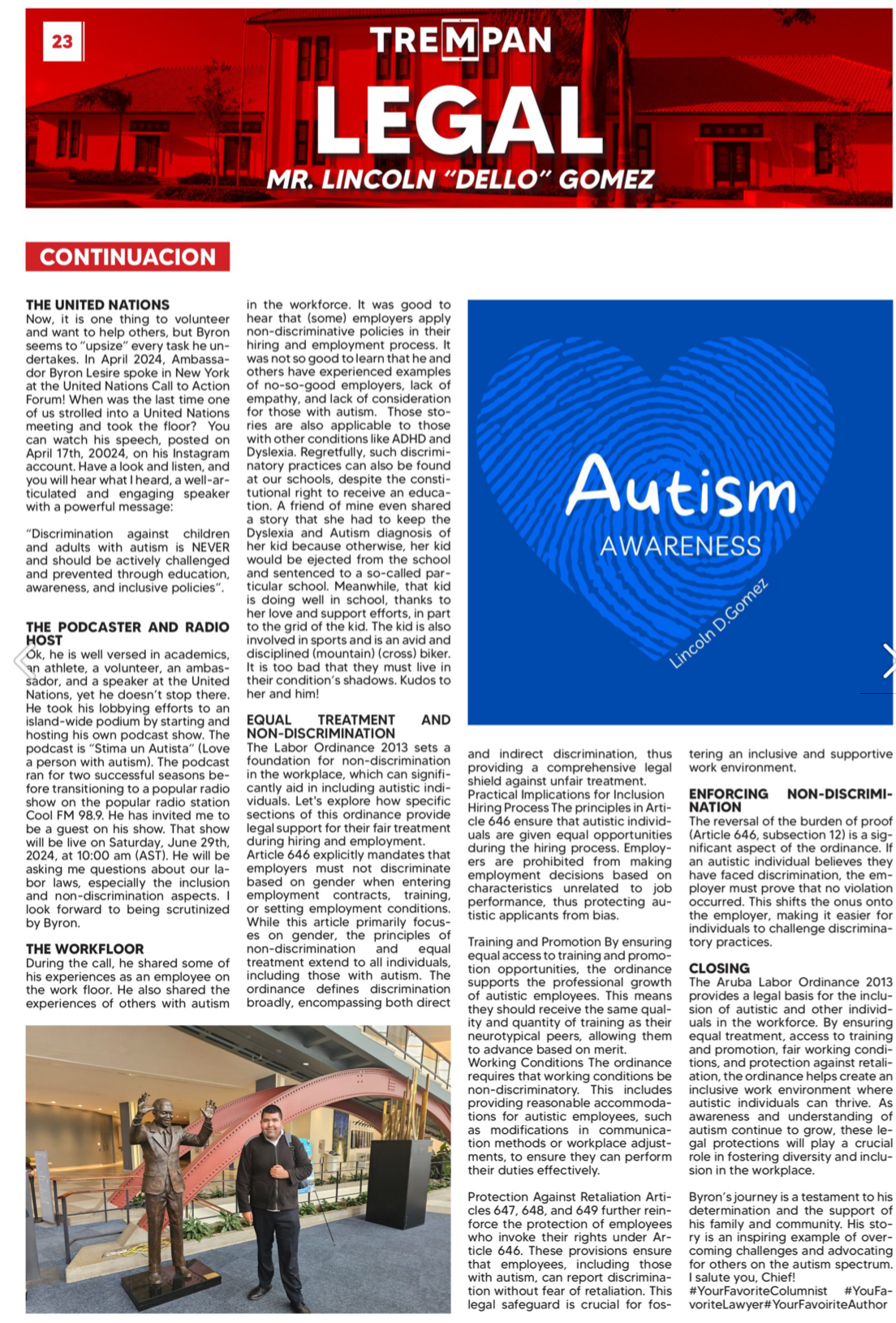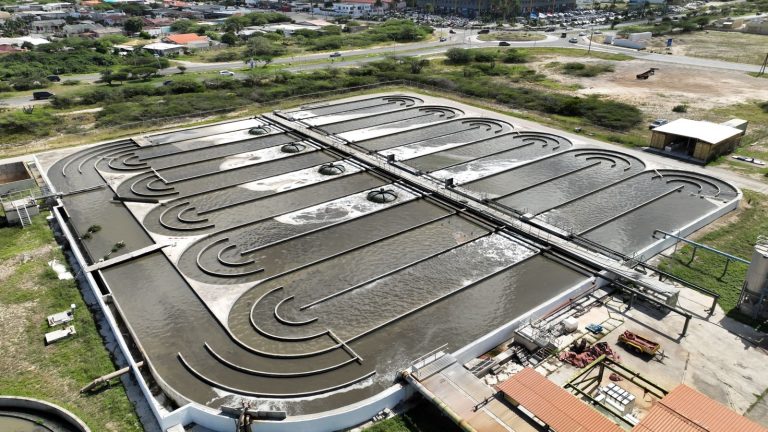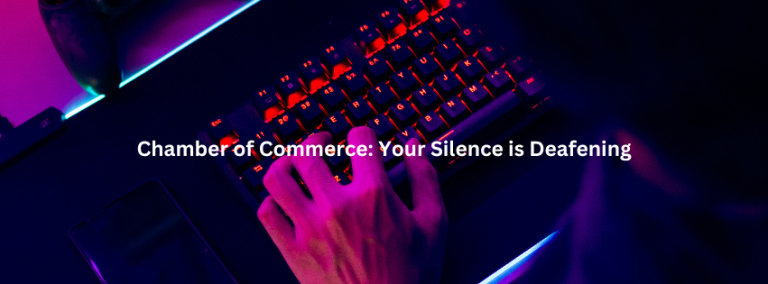Byron Lesire: A Beacon of Inclusion, Perseverance, and Advocacy
Often, I am approached by folks with legal questions, whether at the grocery store, in a parking lot, or at a restaurant. It usually starts with: “I know this is not he time but….”. Many people reach out to comment on my columns or books. I try to be accessible within the time constraints of our busy lives. It’s a great way to meet people; sometimes, I can demystify or resolve a certain issue while walking in the produce aisle at the Do-It Center. Other times, the matter is too complex and requires intervention by me or another professional. Sometimes, I encounter amazing individuals I might not have otherwise met. Last week, I had a virtual meeting with a young man named Byron Lesire, who was diagnosed with autism at the age of 2½. Also on the call was Carolina Thiel-Span, President of the Aruba Autism Foundation (Fundacion Autismo Aruba, aka FAA). Our video conference was remarkable; little did I know that I would be meeting two “rock stars” on a mid-Thursday afternoon. This week’s column is about Byron, Carolina, the Foundation, Byron’s journey, and the legal questions he had.
Byron Lesire
Byron Lesire, at just 24 years old, is a remarkable ambassador for the Aruba Autism Foundation (FAA). Diagnosed with Autism Spectrum Disorder (ASD) at 2 ½, Byron’s journey exemplifies resilience and the power of early intervention. His mother’s unwavering determination to educate herself and the family about autism as soon as she learned about the diagnosis laid the foundation for Byron’s development from childhood to adulthood and his success. Read on to learn more, but now might be a good time to pause, go on Instagram, and hit the follow button for @byronv.a.lesire. I already did.
His academic journey
Finding suitable educational facilities for Byron was a significant challenge in the early years. The development of his speech was delayed until he was four years old. He learned English before his native language, Papiamento. Despite these language hurdles, Byron transitioned from a special kindergarten to a primary school for children with learning disabilities. He completed this part of his education in 2014. His academic journey continued through middle school, where he excelled and completed two middle school programs. In 2017, he graduated as the valedictorian of his class. In 2020, he completed his second middle school program as co-valedictorian. In 2020, he completed his second middle school program as co-valedictorian. Byron then completed a three-year high school program in two years. He is now enrolled in Colegio EPI, the Aruba training institute for secondary vocational education, where he is pursuing a degree in economics. If we had to score his drive and perseverance to pursue education and higher education alone, we would rate him as a top performer. However, his accolades go well beyond academics. Read on, and you will see.
The Athlete
Those who know me understand that I try to lead an active lifestyle. I can be found along the coast doing water swimming, biking, walking, and jogging. At home, I do bodyweight routines with some essential equipment. It keeps me fit and happy, but I know I won’t score any medals soon. See here where our friend, Byron, is different. He competed in the 2022 Special Olympics USA Games in Orlando, FL, where he won not one but two silver medals in bowling. He continued his success at the Special Olympics World Games in Berlin, Germany, securing a bronze medal and a fourth-place finish. When not crushing pins on the bowling lanes, he is out with his sneakers on, hitting the pavement in the various 5K/10K walks organized locally. I guess he follows Tony Horton’s philosophy: “A healthy body breeds a healthy mind and a healthy soul.” So the dude has Autism, he is an academic, and he is an athlete. Lovely feathers to have in his cap, right? Some would even say it’s pretty impressive, but make no mistake. This guy has even more firepower in store!
The Ambassador
Our paths crossed during a Zoom call with the Aruba Autism Foundation. He politely introduced himself, without using titles or accolades, and passed the floor to the foundation’s president, Carolina Thiel-Span. She first told me a bit about the foundation and then a “little” about Byron. I was impressed. It seems that his mother’s drive to help him strive despite his diagnosis, he then, in 2021 – after the pandemic – joined the foundation. He not only contributed to various autism awareness campaigns and, in April of that year, he also participated in several meetings and presentations with private companies and the Parliament of Aruba, advocating and lobbying for the inclusion of those with autism in general but also on the work floor. How about that for being an active and contributing member of the community?
The United Nations
Now, it is one thing to volunteer and want to help others, but Byron seems to “upsize” every task he undertakes. In April 2024, Ambassador Byron Lesire spoke in New York at the United Nations Call to Action Forum! When was the last time one of us strolled into a United Nations meeting and took the floor? You can watch his speech, posted on April 17th, 20024, on his Instagram account. Have a look and listen, and you will hear what I heard, a well-articulated and engaging speaker with a powerful message:
“Discrimination against children and adults with autism is NEVER and should be actively challenged and prevented through education, awareness, and inclusive policies”.
The Podcaster and Radio Host
Ok, he is well versed in academics, an athlete, a volunteer, an ambassador, and a speaker at the United Nations, yet he doesn’t stop there. He took his lobbying efforts to an island-wide podium by starting and hosting his own podcast show. The podcast is “Stima un Autista” (Love a person with autism). The podcast ran for two successful seasons before transitioning to a popular radio show on the popular radio station Cool FM 98.9. He has invited me to be a guest on his show. That show will be live on Saturday, June 29th, 2024, at 10:00 am (AST). He will be asking me questions about our labor laws, especially the inclusion and non-discrimination aspects. I look forward to being scrutinized by Byron.
The Workfloor
During the call, he shared some of his experiences as an employee on the work floor. He also shared the experiences of others with autism in the workforce. It was good to hear that (some) employers apply non-discriminative policies in their hiring and employment process. It was not so good to learn that he and others have experienced examples of no-so-good employers, lack of empathy, and lack of consideration for those with autism. Those stories are also applicable to those with other conditions like ADHD and Dyslexia. Regretfully, such discriminatory practices can also be found at our schools, despite the constitutional right to receive an education. A friend of mine even shared a story that she had to keep the Dyslexia and Autism diagnosis of her kid because otherwise, her kid would be ejected from the school and sentenced to a so-called particular school. Meanwhile, that kid is doing well in school, thanks to her love and support efforts, in part to the grid of the kid. The kid is also involved in sports and is an avid and disciplined (mountain) (cross) biker. It is too bad that they must live in their condition’s shadows. Kudos to her and him!
Equal Treatment and Non-Discrimination
The Labor Ordinance 2013 sets a foundation for non-discrimination in the workplace, which can significantly aid in including autistic individuals. Let’s explore how specific sections of this ordinance provide legal support for their fair treatment during hiring and employment.
Article 646 explicitly mandates that employers must not discriminate based on gender when entering employment contracts, training, or setting employment conditions. While this article primarily focuses on gender, the principles of non-discrimination and equal treatment extend to all individuals, including those with autism. The ordinance defines discrimination broadly, encompassing both direct and indirect discrimination, thus providing a comprehensive legal shield against unfair treatment.
Practical Implications for Inclusion
- Hiring Process The principles in Article 646 ensure that autistic individuals are given equal opportunities during the hiring process. Employers are prohibited from making employment decisions based on characteristics unrelated to job performance, thus protecting autistic applicants from bias.
- Training and Promotion By ensuring equal access to training and promotion opportunities, the ordinance supports the professional growth of autistic employees. This means they should receive the same quality and quantity of training as their neurotypical peers, allowing them to advance based on merit.
- Working Conditions The ordinance requires that working conditions be non-discriminatory. This includes providing reasonable accommodations for autistic employees, such as modifications in communication methods or workplace adjustments, to ensure they can perform their duties effectively.
- Protection Against Retaliation Articles 647, 648, and 649 further reinforce the protection of employees who invoke their rights under Article 646. These provisions ensure that employees, including those with autism, can report discrimination without fear of retaliation. This legal safeguard is crucial for fostering an inclusive and supportive work environment.
Enforcing Non-Discrimination
The reversal of the burden of proof (Article 646, subsection 12) is a significant aspect of the ordinance. If an autistic individual believes they have faced discrimination, the employer must prove that no violation occurred. This shifts the onus onto the employer, making it easier for individuals to challenge discriminatory practices.
Closing
The Aruba Labor Ordinance 2013 provides a legal basis for the inclusion of autistic and other individuals in the workforce. By ensuring equal treatment, access to training and promotion, fair working conditions, and protection against retaliation, the ordinance helps create an inclusive work environment where autistic individuals can thrive. As awareness and understanding of autism continue to grow, these legal protections will play a crucial role in fostering diversity and inclusion in the workplace.
Byron’s journey is a testament to his determination and the support of his family and community. His story is an inspiring example of overcoming challenges and advocating for others on the autism spectrum. I salute you, Chief!
#YourFavoriteColumnist #YouFavoriteLawyer#YourFavoriteAuthor

